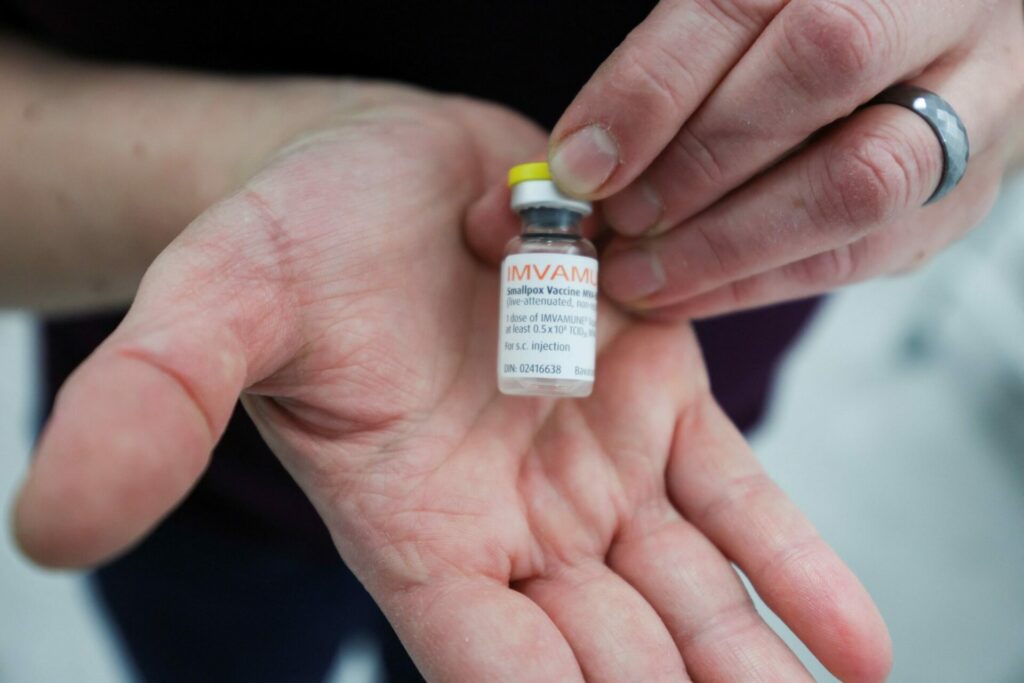Exasperated by the strict eligibility criteria in Belgium, and alarmed by the rapid spread of the monkeypox virus, many Belgians are now crossing the border to get vaccinated against the monkeypox virus in France, Belgian newspaper De Standaard reports.
In Belgium, there are only around 3,000 vaccines against the virus in storage and new deliveries are not expected until the Autumn. In the meanwhile, cases are on the rise. In Belgium alone, there are 482 cases as of 3 August, up over 20% from last week. There are now over 22,000 cases globally.
Initial data shows that the virus is being predominantly spread between men who have sex with men, putting enormous pressure on Belgium’s LGBTQ+ community and even worsening social stigma. Many members of this community, for fear of the rapid spread of the virus, are urgently seeking protection.
Compared to France, Belgium’s criteria for receiving a vaccine against the virus is reasonably strict.
In order to be eligible to receive a vaccine, Belgians must be severely immunocompromised, male or transgender sex workers, men who have sex with men at high risk of exposure (HIV PrEP medication users, HIV positive men), HIV clinic health care workers, and other sexual health medical staff.
LGTBQ+ Belgians, however, are reporting difficulty in receiving these vaccines, even if they are technically eligible. Some may not be deemed sexually active enough to qualify, but would still like to protect those close to them. Even Belgians infected with the virus can only receive a vaccine in the first four days of infection.
Protecting loved-ones
Victor, a gay man from Brussels, told De Standaard that he travelled to the French city of Lille to get a preventive vaccine. “Not just for myself,” he explained, “but also for the people around me.” With the Belgian regulations too strict, Victor made an appointment in France.
If vaccine supply is sufficient, monkeypox vaccination is open to anyone in France regardless of nationality and sexual orientation. If supply runs low, priority is given to men who have sex with men, sex workers, and high-risk individuals.
“In the first week we had 170 shots, also with about ten Belgian,” said Karima Chouia of the CeGIDD (Free Information Centre for the Screening and Testing of HIV) in Lille. “We intend to go to 250 shots per week.”
The French testing centre is currently handling the demand and can still afford to receive Belgian travellers, but warned of this much later change. In France, there are around 40,000 doses in stock.
Victor reports that his experience at CeGIDD went smoothly. “I had to answer some general medical questions,” he said. “They didn’t even ask about my nationality.” The centre even booked Victor a follow-up appointment for a month later.
On social media, Victor has appealed for members of the LGTBQ+ community to do the same. “I have the impression that a lot of people will do that now. Men who belong to the risk group just want a vaccine quickly.”
Belgians look abroad for their medical needs
Many Belgians are already taking the initiative. Flemish member of parliament Orry Van de Wauwer, while at a conference in Canada, also received a monkeypox vaccine. In Belgium, he would not ordinarily be eligible.
“When then numbers started to rise, I got scared,” Van de Wauweer admitted.
Now, questions are being asked about Belgium’s comparatively restrictive policies and low number of doses. Belgian authorities are currently using a vaccine called Jynneos, developed by Danish pharmaceutical company Bavarian Nordic. For full protection, two doses of the vaccine must be administered.
Related News
- Preventive vaccination best option to limit monkey pox
- Belgian monkeypox vaccination strategy to change on Monday
- Demand for monkeypox vaccine outstrips supply in Belgium
According to lead virologist Pierre Van Damme, from the University of Antwerp, any easing of Belgium’s restrictive policy could risk exhausting supply.
“We have 3,000 doses available and 2,000 patients at risk,” he explained. “If we were to give them two doses quickly, our stock would already be exhausted. That is why we have decided to start the first dose now and only give the second dose in the autumn, when we will receive 30,000 extra doses.”
Flemish minister Hilde Crevits told De Standaard that rationing supplies, for the time being, was the only responsible prevention policy. “Of course we are in favour of a broader prevention campaign, but you can only use the vaccines that are available,” she said.
In the meantime, the minister said that Belgian authorities were working on raising awareness about the virus. The World Health Organisation is now actively advising men who have sex with men to reduce their sexual contact and to avoid high-risk activities.

